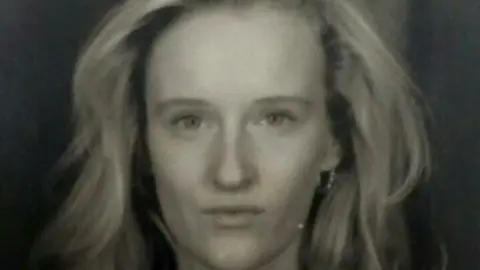Amanda Bowles: Doctor error contributed to anorexic woman's death
 Family photo
Family photoA decision not to "urgently" refer an anorexic woman whose condition had significantly deteriorated contributed to her death, a coroner said.
Amanda Bowles, 45, was found at her Cambridge home in September 2017.
An eating disorder psychiatrist who assessed her on 24 August apologised to Ms Bowles' family for not organising an admission under the Mental Health Act.
Assistant coroner Sean Horstead said the decision not to arrange an assessment "contributed to her death".
Mr Horstead told an inquest at Huntingdon Racecourse that also on the balance of probabilities the "decision not to significantly increase the level of in-person monitoring" following 24 August "contributed to the death".
Ms Bowles' sister, Rachel Waller said after the inquest: "[The coroner] has been very careful and very measured but there were failings which he referred to as structural issues.
"If you're talking about the technicalities of whether she was on somebody's books or not, she was known to these services and the fact that somebody can die on their own in their house without having appropriate treatment is something that shouldn't be happening."
Dr Jane Shapleske, a clinical psychiatrist at Cambridgeshire and Peterborough NHS Foundation Trust (CPFT), went to Ms Bowles home to assess her following serious concerns from a GP.
During the assessment Dr Shapleske found the mother-of-one's health had "significantly deteriorated" and she "was at a high risk of death".
 Family photo
Family photoShe told the inquest she regretted not organising an admission, but felt Ms Bowles would agree to a voluntary admission when a bed became available and would have been less receptive to treatment had an admission been forced.
In comments directed at Ms Bowles' family she said her decision "weighs incredibly heavy on me. I'm extremely sorry".
Assistant coroner for Cambridgeshire and Peterborough, Mr Horstead said: "The level of physical risk was identified... but the urgency to act on the medical risks was absent."
He added that "no additional safeguarding arrangements were made... to closely monitor any further deterioration" in the interim period between the assessment and admission.
The inquest was also told that following Ms Bowles discharge from CPFT's Adult Eating Disorder Service (AEDS) in December 2016 her condition was not monitored until May 2017.
On 25 May 2017 a doctor noted she "hadn't been reviewed for some time, seems to have fallen through the net".
In his narrative conclusion, Mr Horstead said it was "possible... that had a robust system for monitoring Ms Bowles in the months preceding her death been in place, then the deterioration in her physical and mental health may have been detected earlier" and led to an earlier referral to AEDS.
He said this absence "was the direct consequence of the lack of formally commissioned monitoring in either primary or secondary care for eating disorder patients".
Mr Horstead concluded this absence "possibly contributed to Ms Bowles' death".

Ms Waller said "the most important thing to [her sister] was her son".
"She really battled this illness and even though it wasn't her, it was a massive part of her life, but she battled that to enable him to have a relatively normal life."
A CPFT spokesman said: "We extend our sincere condolences to the family and friends of Amanda Bowles.
"We remain committed to the development of eating disorder services in partnership with local, regional and national providers, and will act on points of learning as they emerge."
A spokeswoman for NHS England and NHS Improvement in the East of England, said they were "committed to expanding and improving access to eating disorder services in the community".
She added: "There has been continued investment in Cambridgeshire and Peterborough to further improve how adult eating disorder services work together."
The inquest in Huntingdon is the latest to be heard relating to a cluster of five deaths of people with anorexia between 2012 and 2018.
If you are affected by any of the issues in this story, you can talk in confidence to eating disorders charity Beat by calling its adult helpline on 0808 801 0677 or youth helpline on 0808 801 0711.

Find BBC News: East of England on Facebook, Instagram and Twitter. If you have a story suggestion email [email protected]
To contact us about news video you've filmed in the East of England please email [email protected]
